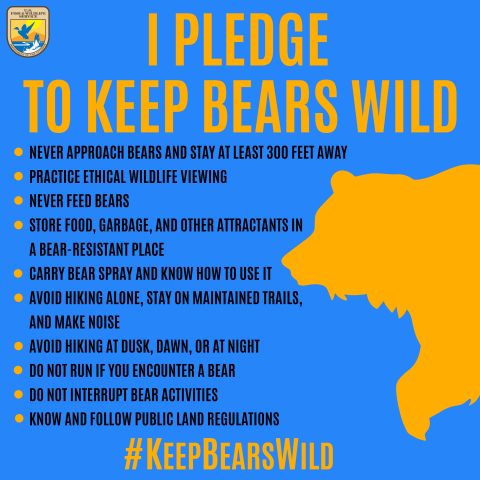MISSOULA — As grizzly bears begin to emerge from their dens this spring in search of food, the U.S. Fish and Wildlife Service and other wildlife managers are asking for the help of residents and visitors in grizzly country to Keep Bears Wild. The Service reminds the public to remain vigilant and take proactive actions to avoid bear conflicts. Male grizzly bears tend to emerge from their dens in March and April, and females with cubs typically appear in April and May.
Residents and visitors in Montana, Wyoming, northeast Washington, and northern and eastern Idaho should be on the lookout for grizzly bears and work to prevent conflicts by following the tips below – avoiding a conflict is always easier than dealing with one.
Keep Bears Wild – save the life of a bear (or your own):
- Store food, garbage, and other attractants with a scent in a bear-resistant place
- Carry bear spray in an accessible location and know how to use it
- Never run if you encounter a bear; learn how to handle an encounter
- Practice ethical wildlife viewing from a distance, stay at least 300 feet away – never approach a bear
- Never feed bears; a fed bear is more likely to be a danger to people
- Avoid recreating alone, stay on maintained trails, and make noise
- Avoid recreating at dusk, dawn, or night
- Do not hike, bike, or run with headphones or earbuds
- Avoid activities in which you move quietly and fast in areas of limited visibility, as this increases your potential for surprising a bear.
Leaving attractants unsecured, such as trash, compost, bird, pet or livestock feed, or food, can draw grizzly bears into human-occupied areas and lead to animals becoming food-conditioned. Food-conditioned grizzly bears can substantially threaten human safety, often necessitating management action. The actions, or lack thereof, of residents and visitors, are pivotal in living safely in grizzly bear habitat. To deter bears from frequenting areas in and around residential or other human-occupied areas and becoming conditioned to human-related food, it is essential to:
- Secure attractants – anything with an odor, such as compost, trash, dog food, livestock food, bird seed, fruit trees, or beehives
- Don’t allow bears to feel comfortable near human-occupied dwellings – there are safe ways to tell a bear to move along by making noise, such as yelling, honking a horn, or banging pots/pans
- Report bear sightings, encounters, and conflicts immediately to your state or Tribal wildlife management agency.
Residents and visitors are encouraged to explore additional grizzly bear safety information available from the Interagency Grizzly Bear Committee for residents, hikers/campers, hunters, and farmers/ranchers.



